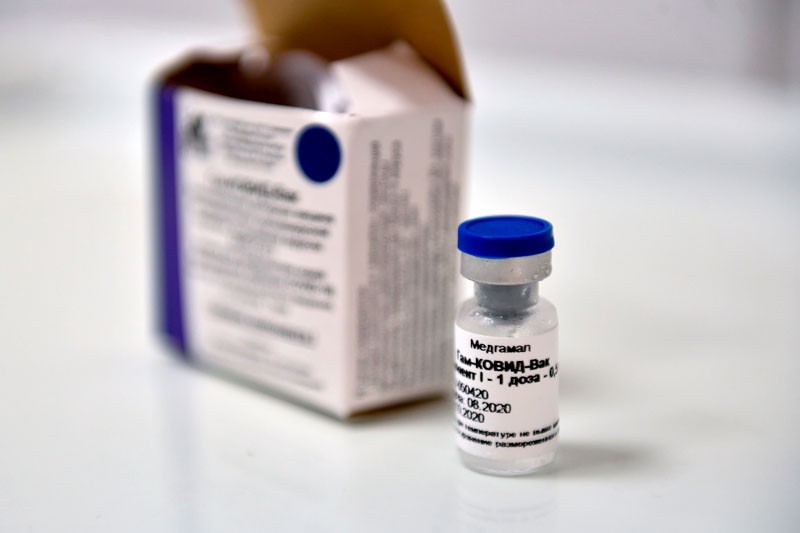A group of researchers have expressed concern about repetitive patterns of data in a paper describing early-phase clinical trials of Russia’s coronavirus vaccine — the first jab worldwide to be approved for widespread use.
In an open letter in The Lancet, which published the trial results1 this month, the researchers highlight values that seem to be duplicated, and warn that the paper presents its results only as box plots without providing a detailed breakdown of the data on which they are based. “While the research described in this study is potentially significant, the presentation of the data raises several concerns which require access to the original data to fully investigate”, the letter says. It has so far been signed by 38 scientists.
The trials tested two slightly different viral-vector vaccines — which use genetically engineered adenoviruses to produce coronavirus proteins in the body — on 76 volunteers. The results indicated that the vaccine produced a strong immune response, and that side effects were limited to mild, short-term effects, such as irritation at injection sites or headaches, in a few people. In August, the Russian authorities approved the vaccine, called Sputnik V, for widespread use, and have said that it could be available to the general public within months.
This fast-track approval caused consternation among researchers, who argued that the decision to roll out the vaccine before larger safety and efficacy trials had been completed was dangerously rushed.
Possible duplications
The open letter was posted on a blog run by molecular biologist Enrico Bucci, who heads a science-integrity company called Resis in Samone, Italy. Bucci says that he noticed irregularities in the Lancet paper soon after it was published. For example, in one figure in which the authors report their measurements of markers of a type of immune cell in the blood, many members of two groups of nine volunteers tested with different formulations of the vaccine seem to have the same levels. “The odds of this arising by coincidence are extremely small,” Bucci says.
“To see such similar data patterns between unrelated measurements is really not likely,” says Konstantin Andreev, who studies viral respiratory infections at Northwestern University at Evanston, Illinois. “These discrepancies are not minor.” Andreev had been independently concerned about aspects of the clinical trial, and signed the open letter shortly after it was made public.
“We are not alleging scientific misconduct, but asking for clarification about how these apparently similar data points came about,” says Bucci. “When we read reports that Russia had started to inject the vaccine into people outside clinical trials, we felt we had to speak out immediately.” Late-phase clinical trials of the vaccine, which will involve tens of thousands of people, began on 26 August.
The paper’s underlying data should be made available, epidemiologist Michael Favorov, president of DiaPrep Systems, a diagnostics company in Atlanta, Georgia. “We have a lot of questionable data — in terms of its presentation,” he says. “Maybe the data are good — we can’t judge.” He adds that the decision to publish the reports without the underlying data seems unusual. By contrast, when clinical studies involving a coronavirus vaccine that was developed by the pharmaceutical company AstraZeneca and the University of Oxford, UK, were published in the same journal2, they were accompanied by a large amount of supplementary data that other researchers were able to scrutinize.
The Russian paper’s lead author, Denis Logunov at the Gamaleya National Research Centre for Epidemiology and Microbiology in Moscow, did not respond to requests for comment from Nature’s news team. But he told the Russian news outlet Meduza that he did not intend to respond to the open letter. He denied that there were errors in the publication, and stated that measured antibody levels were “exactly as they were presented” in the figures. He added that he was in contact with the Lancet and “was ready to clarify any issues”.
The Lancet declined to comment on its policy for providing data in support of clinical trials that it publishes, but issued a statement saying that it “has invited the authors of the Russian vaccine study to respond to the questions raised in the open letter by Enrico Bucci”, and that it would continue to follow the situation closely.
"results" - Google News
September 15, 2020 at 03:58PM
https://ift.tt/2ZGSFv4
Researchers highlight 'questionable' data in Russian coronavirus vaccine trial results - Nature.com
"results" - Google News
https://ift.tt/2SvRPxx
https://ift.tt/2Wp5bNh
Bagikan Berita Ini
















0 Response to "Researchers highlight 'questionable' data in Russian coronavirus vaccine trial results - Nature.com"
Post a Comment